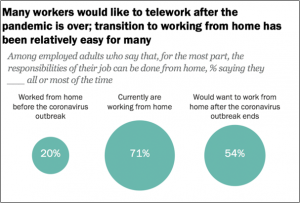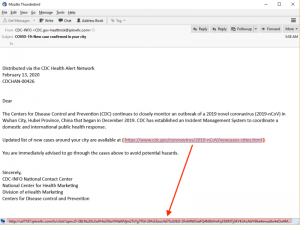Email: info@fc-llc.org
by Freedom Consulting Posted on March 26, 2021

With the advancement in technology and the recent shift towards remote working, cybersecurity is needed now more than ever. Not only has the amount of remote workplaces increased, so has the amount of data breaches. Cybersecurity is an ever-constant evolving issue that needs to have consistent monitoring.
According to a Pew Research Center poll article published in December 2020 (How the Coronavirus Outbreak Has and Hasn’t – Changed the Way Americans Work), nearly 71% of adult employees are working from home all or most of the time. More than half said they would want to continue to work from home, if given the choice (See Image 1). In the United Kingdom, one in three employees works exclusively at home (Silverberg and Smale, 2021). Working remotely provides many benefits to an employee, however, it creates an IT nightmare for employers. Studies have shown that a large number of home employees have not received cyber-security training, and the lack of training and cybersecurity knowledge has led to an increase in data breaches.

Image 1: Percentage of workers currently working from home
COVID-19 and the lockdowns that followed have changed how businesses and schools operate. Both schools and businesses have converted to flex models, with parents working full-time from home and school is conducted ‘virtually’ from home. Cyber threats have increased, and threat actors are taking advantage of the changing environment. Threat actors are using phishing campaigns to target individuals in hopes the individual opens a phishing email related to COVID-19 (See Image 2). According to PurpleSec (a cybersecurity company), cybercrime has increased 600% since the beginning of COVID-19 (Firch, J. 2020).
Not only can your network be attacked through the router, but there are also phishing campaigns sent through your email. A phishing campaign is an email scam designed to steal personal information from victims. Cybercriminals use phishing in an attempt to obtain sensitive information, such as credit card details and login credentials, by disguising themselves as a trustworthy organization or reputable person in email communication.

Image 2: Example of Phishing Email
In 2019, the Oregon Federal Bureau of Investigation (FBI), stated that fraudulent ads are targeting families looking for pets online. “After a few brief messages and many “fees” later, the pet never shows up, and you’re left with nothing but heartbreak and an empty wallet” (FBI, 2019). Besides online security risks from scammers, a security review of the most popular home routers titled, Home Router Security Report, found most of the routers contained at least one major security flaw. The authors of the report summarized it by stating, “ …there is no router without flaws and there is no vendor who does a perfect job regarding all security aspects”. They continue to state that, “Much more effort is needed to make home routers as secure as the current desktop or server systems” (Montalbano, 2020).
Maintaining good cyber hygiene is imperative in today’s ever-evolving cyber world. Consistent monitoring and implementing simple security steps like not clicking on suspicious links or emails and using a VPN that helps prevent your browser from opening any suspicious links can help reduce the chances of a data breach. By taking simple precautions and avoiding clicking on unknown links, you can greatly reduce the chances of a data breach.
If you or your organization would like more information on how to conduct a phishing campaign, please reach out to us at:
https://www.fc-llc.org/contact-us/
References:
Barracuda Networks. (2021 March 12) What is a Phishing Campaign? Barracuda. https://www.barracuda.com/glossary/phishing-campaign
FBI. (2019 February 5) Oregon FBI Tech Tuesday: Building a Digital Defense Against Pet Adoption Scams. FBI. https://www.fbi.gov/contact-us/field-offices/portland/news/press-releases/oregon-fbi-tech-tuesday-building-a-digital-defense-against-pet-adoption-scams
Firch, J. (2020, December 31) 10 Cyber Security Trends You Can’t Ignore In 2021. PurpleSec. https://purplesec.us/cyber-security-trends-2021/
Montalbano, E., (2020, July 10) Report: Most Popular Home Routers Have ‘Critical’ Flaws. The Threat Post. https://threatpost.com/report-most-popular-home-routers-have-critical-flaws/157346/
Silverberg, D. & Smale, W. (2021, February 1) Home working increases cyber-security fears. BBC. https://www.bbc.com/news/business-55824139
© 2024 Freedom Consulting LLC. All rights reserved